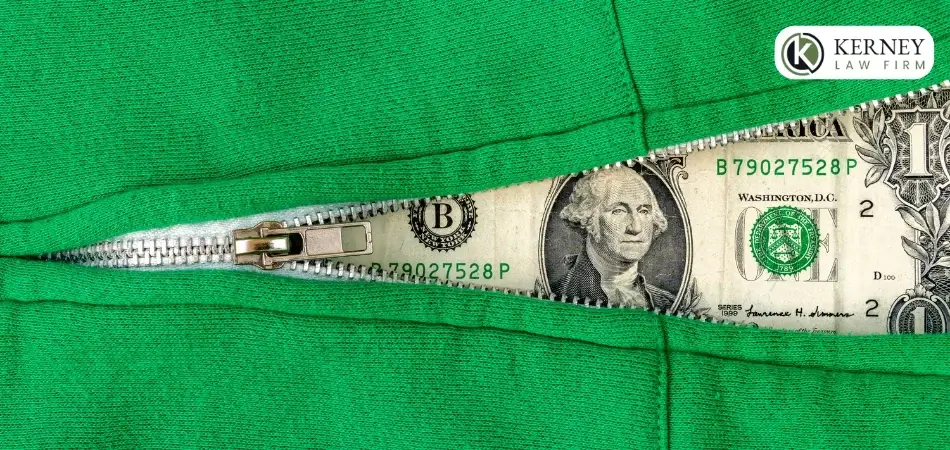How Do You Pay a Tennessee Bankruptcy Lawyer if You Have No Money?

If you have a significant debt load and are looking to build a more stable financial future, you may be considering bankruptcy. Working with a knowledgeable attorney is the most effective way to navigate bankruptcy in Tennessee, but it can be a large investment. You are likely asking yourself, “How do you pay a Tennessee bankruptcy lawyer if you have no money?”
Cost to File for Bankruptcy
Creating a plan for financing a bankruptcy filing begins with understanding how much you can expect to pay and when the different types of fees are due.
Regardless of the type of bankruptcy you are filing, there will be petition fees that must be paid to the court when you file. If you are filing Chapter 7 bankruptcy, the fees are $338. If you are filing Chapter 13 bankruptcy, the fees are $313. There are, however, limited instances where the filer can qualify for a fee waiver or payment plan for these fees.
Individuals or married couples who file for Chapter 7 or Chapter 13 bankruptcy are also required to complete pre-bankruptcy credit counseling before filing and pre-discharge debtor education after filing. These courses must be sought out and paid for by the person filing for bankruptcy.
Some people are often surprised to learn that Tennessee requires both federal and state-specific steps in the bankruptcy process, making professional guidance even more important.
Attorney fees will generally make up the bulk of the overall bankruptcy cost. Unfortunately, predicting the amount an attorney will charge for your bankruptcy case can be difficult because the cost will be impacted by the type of bankruptcy, the complexity of the case, and the filer’s financial situation.
How to Pay Attorney Fees
Paying attorney fees can seem like an impossible task for someone considering bankruptcy. Saving the funds to pay the upfront costs can be difficult, but the skilled support of a bankruptcy attorney can make all the difference in the outcome of your case. Common ways people have gathered funds for a Tennessee bankruptcy attorney include:
- Using a tax refund. A tax refund can be an influx of money that can be used to get your finances back on track. However, there are some key factors about tax refunds during bankruptcy that should be considered.
- Sell unused items. If you have valuable items that you can spare, the proceeds from selling these items can be used to pay attorney fees.
- Temporarily stop paying unsecured debts. If you have decided bankruptcy is the right choice for you and you believe you qualify, you can redirect funds from unsecured debt payments to legal fees.
- Borrow from family or friends. It can be uncomfortable to ask your loved ones for help, but they often want to support you in creating a better financial future. Once your bankruptcy case is complete, you can prioritize paying them back.
- Payment plans. Some bankruptcy attorneys will allow pre-filing payment plans for those filing Chapter 7 bankruptcy. Additionally, you can choose to file Chapter 13 bankruptcy instead. Attorney fees are often built into Chapter 13 repayment plans, making it easier to manage these costs over time. Payment plans are built into this type of bankruptcy, and attorney fees can become a part of the payments made over the repayment period.
Benefits of Working With a Bankruptcy Attorney
Though there are solutions for paying attorney fees during bankruptcy, you may be wondering if their services are worth the investment. The benefits of working with an experienced bankruptcy attorney are significant and include:
- Protection from creditors. Though an automatic stay should prevent creditors from communicating with you or collecting more funds, some may challenge these rules. An attorney can ensure the automatic stay is fully enforced, as explained in this guide.
- Representation in court. Bankruptcy court procedures can be complex. An attorney will represent you during all hearings and manage communication with relevant parties.
- Law application. Bankruptcy rules can be confusing, especially since both federal and state laws apply. For example, Tennessee residents cannot use federal exemptions and must instead follow state-specific exemptions. An attorney can help ensure you utilize exemption rules to the fullest extent of the law.
- Peace of mind. Many questions are likely to arise as you navigate the bankruptcy process. Working with an attorney means you have access to accurate answers without spending hours searching through online articles.
Working with a knowledgeable and trusted bankruptcy attorney can make all the difference in reaching a positive outcome for your bankruptcy case.
FAQs
How Much Does a Bankruptcy Lawyer Cost in TN?
The total cost an attorney may charge will vary widely depending on the specific circumstances of the case. The complexity of your situation, the type of bankruptcy that you need to file, and the value of your assets can impact an attorney’s fees. Speaking with an attorney during a consultation can help you understand the attorney’s fees and when they must be paid.
How Do You File for Bankruptcy in Tennessee if You Have No Money?
In Tennessee in 2023, there were 7,785 Chapter 7 bankruptcy filings and 11,756 Chapter 13 bankruptcy filings. While funding a bankruptcy can be challenging, strategies such as pausing unsecured payments, using refunds, or selling assets may help you gather the needed funds.
Though filing for bankruptcy with low funds can be challenging, it is far from impossible. Solutions such as selling unused personal belongings, requesting help from loved ones, and using funds from a tax refund are all options that can help you gather funds to file for bankruptcy.
Can I Use a Credit Card to Pay My Bankruptcy Attorney?
You cannot use a credit card to pay for your own bankruptcy attorney. Lawyers cannot recommend that you incur debt right before filing for bankruptcy because you generally cannot incur debt with the intent of having it discharged during the bankruptcy. However, if your chosen attorney accepts credit card payments, another person can use their credit card to pay the attorney fees on your behalf.
Finding Solutions for Paying Attorney Fees With a Compassionate & Skilled Law Firm
It is not uncommon for individuals facing bankruptcy to be concerned about how they will cover the upfront costs of filing. Kerney Law Firm understands these concerns and can work with you to find solutions. If you are considering bankruptcy to manage overwhelming debt, reach out to our office today to see how we can help you succeed.


